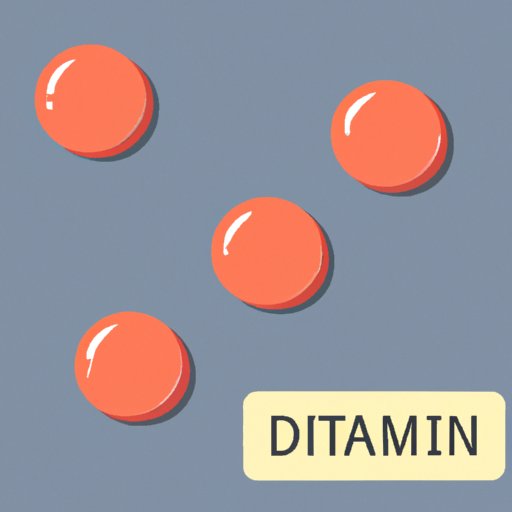
Introduction
Vitamin D is an essential nutrient for good health, yet many people don’t know how much they need. In this article, we’ll explore everything you need to know about how much Vitamin D you need, why it’s important, and how to get it.
A Comprehensive Guide to Understanding Your Vitamin D Needs
Vitamin D is a fat-soluble vitamin that the body can produce itself when exposed to sunlight. It helps to regulate calcium and phosphorus levels in the body, which is crucial for strong bones and teeth.
There are two main forms of Vitamin D: D2 and D3. While both are important, D3 is more effective at raising Vitamin D levels in the body.
Aside from promoting bone health, Vitamin D is also vital for a healthy immune system and can lower the risk of several chronic diseases including multiple sclerosis, diabetes, and some types of cancer.
How much Vitamin D you need depends on a variety of factors such as age, sex, and lifestyle. For most people, the recommended daily intake is 600-800 IU (International Units). However, darker skin tones and individuals who live in areas with less sun exposure may need more.
Why Vitamin D Matters More Than You Think
Aside from promoting bone health and a strong immune system, Vitamin D has several other benefits. Studies have shown that increasing Vitamin D levels can lower the risk of certain cancers, heart disease, and depression.
Vitamin D deficiencies are prevalent around the world, with some estimates suggesting over 1 billion people worldwide are deficient. This is concerning given that Vitamin D deficiency is linked to several health problems such as osteoporosis, bone fractures, and muscle weakness.
Being deficient in Vitamin D can also lead to a range of health problems, including osteoporosis, bone fractures, and muscle weakness.
A Scientific Explanation of Vitamin D Requirements
The primary way to obtain Vitamin D is through exposure to sunlight. When exposed to sunlight, the skin converts a form of cholesterol into Vitamin D3. This is why people who live in areas with less sun exposure tend to have lower levels of Vitamin D than those who live in sunnier climates.
Other factors that influence how much Vitamin D a person needs include skin color, age, and geographic location. For example, people with darker skin tones need more sun exposure to produce the same amount of Vitamin D than those with lighter skin.
Vitamin D levels can be tested through a blood test, and optimal levels may differ depending on factors such as age and underlying conditions.
Top Sources of Vitamin D and How to Get Them
The best way to get Vitamin D is by exposing your skin to sunlight. However, there are several food sources of Vitamin D, including fatty fish, mushrooms, and egg yolks. Many foods such as milk, cereals, and orange juice are also typically fortified with Vitamin D.
While getting Vitamin D from food is possible, it can be challenging to get enough from diet alone. For individuals who struggle to get enough through sun exposure and diet, supplements can be useful.
Incorporating Vitamin D-rich foods and supplements into a healthy diet can help ensure you’re getting enough of this crucial nutrient to maintain good health.
Frequently Asked Questions About Vitamin D
How much Vitamin D should I take? When is the best time to take it? What happens if I take too little or too much? These are some of the most common questions people have about Vitamin D.
When it comes to supplements, it’s best to talk to your healthcare provider about how much to take and when to take it. Taking too little Vitamin D can result in a deficiency, while taking too much can lead to toxicity.
If you are taking medications or have underlying health conditions, it’s also essential to talk to your healthcare provider about potential interactions with Vitamin D.
Conclusion
Vitamin D is an essential nutrient for good health. It’s important to be aware of your Vitamin D needs and to ensure you’re getting enough through sun exposure, diet, and/or supplements. Speak to your healthcare provider to find out more about your specific Vitamin D requirements and how to optimize your intake of this vital nutrient.




